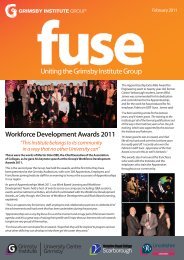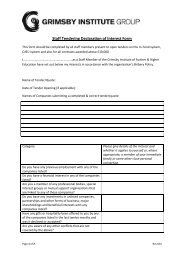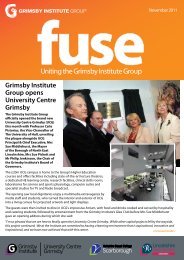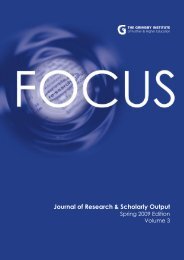Journal of Research & Scholarly Output 2006 - Grimsby Institute of ...
Journal of Research & Scholarly Output 2006 - Grimsby Institute of ...
Journal of Research & Scholarly Output 2006 - Grimsby Institute of ...
Create successful ePaper yourself
Turn your PDF publications into a flip-book with our unique Google optimized e-Paper software.
values, educational background, systems<br />
and expectations. The intention is to add to<br />
current discourse in what is increasingly an<br />
important dimension in the field <strong>of</strong><br />
education.<br />
Key words:<br />
International, teaching education, values,<br />
culture, social reality.<br />
culturally diverse in its composition.<br />
Intentional or unintentional ignoring or<br />
ignorance <strong>of</strong> factors such as societal<br />
background, history, cultural differences,<br />
attitudes and values, educational<br />
background and expectations may impact<br />
on the successful delivery <strong>of</strong> educational<br />
programmes to an international student<br />
group.<br />
Introduction<br />
It is <strong>of</strong>ten argued that the global dimension<br />
has added impetus to the effective<br />
commodification <strong>of</strong> contemporary life with<br />
the world rapidly moving towards a<br />
converging commonality with needs<br />
becoming homogenised (Ritzer, 1996;<br />
Smart 1999). Both the Further and Higher<br />
Education sectors now operate within a<br />
dynamic global market, with universities and<br />
colleges developing international<br />
perspectives and pursuing marketing<br />
strategies to attract international students<br />
(Morrison, 1998). With education however,<br />
an alternative view may be to acknowledge<br />
that although there are global needs and<br />
opportunities we may need to accept that<br />
education per se may not be truly a global<br />
product. Just as a manufacturing company<br />
may change the packaging <strong>of</strong> a product or<br />
vary the specification slightly to suit the<br />
country or culture <strong>of</strong> a country they wish to<br />
access, education programmes and/or<br />
curricula may also require adaptation for an<br />
international market. In reality, the allure <strong>of</strong> a<br />
universal educational product may distract<br />
from the real challenge educators face<br />
today, that is to deliver and support ‘the<br />
product’ in a manner that suits a student<br />
population which is likely to be increasingly<br />
In addition to discussing these issues in<br />
general terms, because <strong>of</strong> the <strong>Grimsby</strong><br />
<strong>Institute</strong> <strong>of</strong> Further and Higher Education’s<br />
rapidly growing direct involvement in China,<br />
specific reference will be made to issues<br />
arising from teaching Chinese students in<br />
the UK. The <strong>Grimsby</strong> <strong>Institute</strong>’s increasing<br />
involvement in China is not unique as,<br />
Rosecky et al., (2004) point out:<br />
“Evolution in its worldview has moved China<br />
from a classic Marxism/Mao dicta to a more<br />
pragmatic educational approach, one that<br />
includes non-public education”.<br />
Universities, institutes and colleges and<br />
their educational programmes do not<br />
operate in a vacuum, they are through the<br />
tutors, support staff and students<br />
inextricably connected to their societalcultural<br />
environment. Recognition <strong>of</strong> the<br />
diverse cultural and educational<br />
backgrounds <strong>of</strong> the students should<br />
highlight the necessity to review the<br />
assumptions that we make when teaching<br />
or developing educational programmes.<br />
Burrell, & Morgan,(1979) argue:<br />
“The rationale for a particular way <strong>of</strong> thinking<br />
is grounded in a network <strong>of</strong> implicit or<br />
explicit assumptions regarding ‘ontology’<br />
(Science <strong>of</strong> Being –Reality) and ‘human<br />
Page 22<br />
FOCUS

















